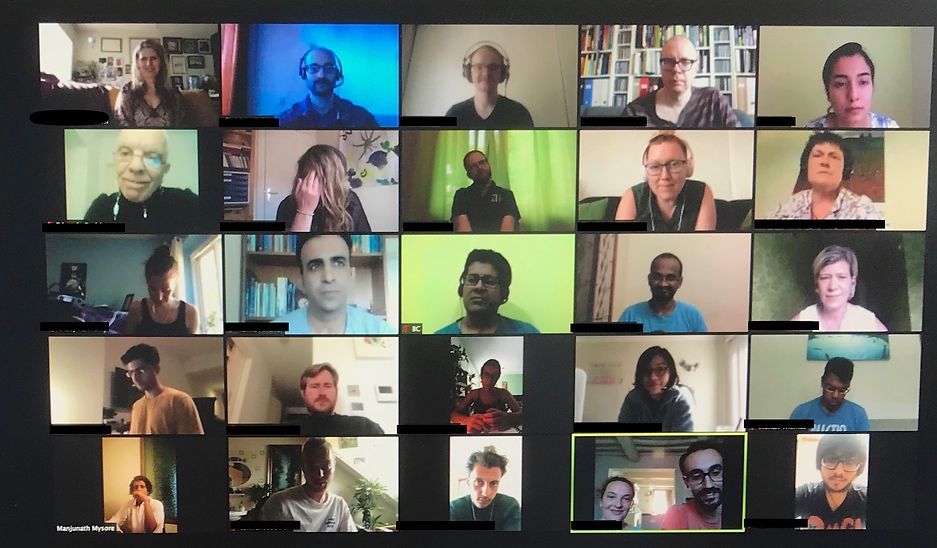IRC Level 1 online
to be announced
The International Rhythm Course Level 1 is a two week intensive online program to solidify the fundamental expressive qualities of rhythm and explore the rich world of rhythmic complexities. The course is led by composer/flutist Ned McGowan (Utrecht Conservatory), the eminent Carnatic violinist Dr. Mysore Manjunath, renowned percussionist B.C. Manjunath, and vocalist Kristina Fuchs (Antwerp Conservatory).
Carnatic Music
The Carnatic system of rhythm with its practical approach to complexities, forms the International Rhythm Course's (IRC) basic method for both a foundation and a structured exploration of rhythm in music. The IRC teaches the traditional approach to rhythm from the Carnatic perspective and places it both theoretically and practically next to Western methods. B.C. Manjunath will teach the basics of proper Konnakkol syllables and pronunciation, and the rhythmical approach of his pieces take a prominent role in the course materials.
method and difficulty
The method of the course is to explore a limited number of topics in depth, such as quintuplets, korvai, melodic development, etc… Rhythmic exercises and pieces are taught, explained and analyzed for learning, inspiration and adaptation to your music.
The materials are introduced on both basic and advanced levels and assignments are given with various difficulties from which each participant can choose, according to their level.
Participants from previous IRCs or other rhythm workshops who would like to review the materials are welcome, and their experience will also be taken into account in the assignments.
For whom is the IRC Level 1?
The Course is designed for professionals, college-level students, and experienced amateurs. A high rhythmic proficiency level is not necessary, as theory, exercises and homework are given in a way that the participants can choose their appropriate difficulty. Performers of all instruments and composers are welcome regardless of style (i.e. Classical, improvised or non-Western musics). Existing ensembles and bands are welcome to apply as a group, as well as other rhythmical art forms (dance, rap, etc...). If there are any doubts or questions about qualifications, just write for more information.
Each participant will receive a diploma and earns 2 credits (ECTS) for the course.
the online experience

The online experience consists of the teachers demonstrating, explaining, answering questions and participating in discussions. Students sing or play along at home with the teacher's demonstration. While theory is given, the main aim of the course is practical: homework is assigned to be learned and during the session some daily practice is understood.
There are two types of online lessons: teaching lessons and coaching lessons. Teaching lessons are structured lectures, explanations and demonstrations of rhythmic materials and pieces, for the full group. Coaching lessons take place in breakout rooms and are more interactive, where practice, discussion and feedback are mixed together in a free way.
Participants are given the opportunity (but not required) to share their own videos of the assignments, which will be collected on a class web page with links to the videos of the lessons.
“I thought it was great to have a good mix of "essential" lessons in a seminar fashion and "practice" sessions to deepen understanding of the material and address questions/issues.”
“In my case I think that you are always learning by seeing your own practice and that of others. There were very creative approaches that trigger my new ideas.”
I liked the structure. It allowed time to process the new information and work on skills in between teaching days.
My first ever online anything. And it was great. Easy going and no problems with connection. It still felt like a group.
I am happy that these online courses are open, because it is easier for me to assist, otherwise I wouldn't be able to be there.
It's he first time I take an online course, I think it was a great experience, the organization was really good
Excellent. Great to be able to do it at home and not have to travel.
I really enjoyed it. I liked the fact, that there was sort of 2 levels of communication, which would not be possible in normal situation. For example- BC has been clarifying things in the chat while Dr. Manjunath was talking- avoiding interruptions and just quickly pointing us to, how it relates to previously discussed. Or information/material quickly shared by other students- different forms of notation.
Schedule
The six days of teaching lessons are on Mondays and Wednesdays, spread over three weeks, at the following times (Central European CET):
16:15 - 17:30 and 17:45 - 19:00
The two coaching lessons take place on the Fridays, and are optional for attendence.
16:00 - 18:00
The full schedule is as follows:
July 12, 16:15 - 19:00 (always with break) - teaching lesson 1
July 14, 16:00 - 18:00 - teaching lesson 2
July 16, 16:15 - 19:00 - coaching (coachings are optional)
July 19, 16:00 - 18:00 - teaching lesson 3
July 21, 16:15 - 19:00 - teaching lesson 4
July 23, 16:15 - 19:00 - coaching
July 26, 16:00 - 18:00 - teaching lesson 5
July 28, 16:15 - 19:00 - teaching lesson 6
July 30, 16:00 - 18:00 - coaching
For comparison, here are some times in other time zones of the teaching lesson times:
California: 7:15 - 10:00
New York / Boston: 10:15 - 13:00
UK: 15:15 - 16:00
Western Europe: 16:15 - 19:00
Turkey: 17:15 - 20:00
Iran: 18:15 - 21:00
Madagascar: 18:15 - 21:00
India: 20:45 - 23:30
